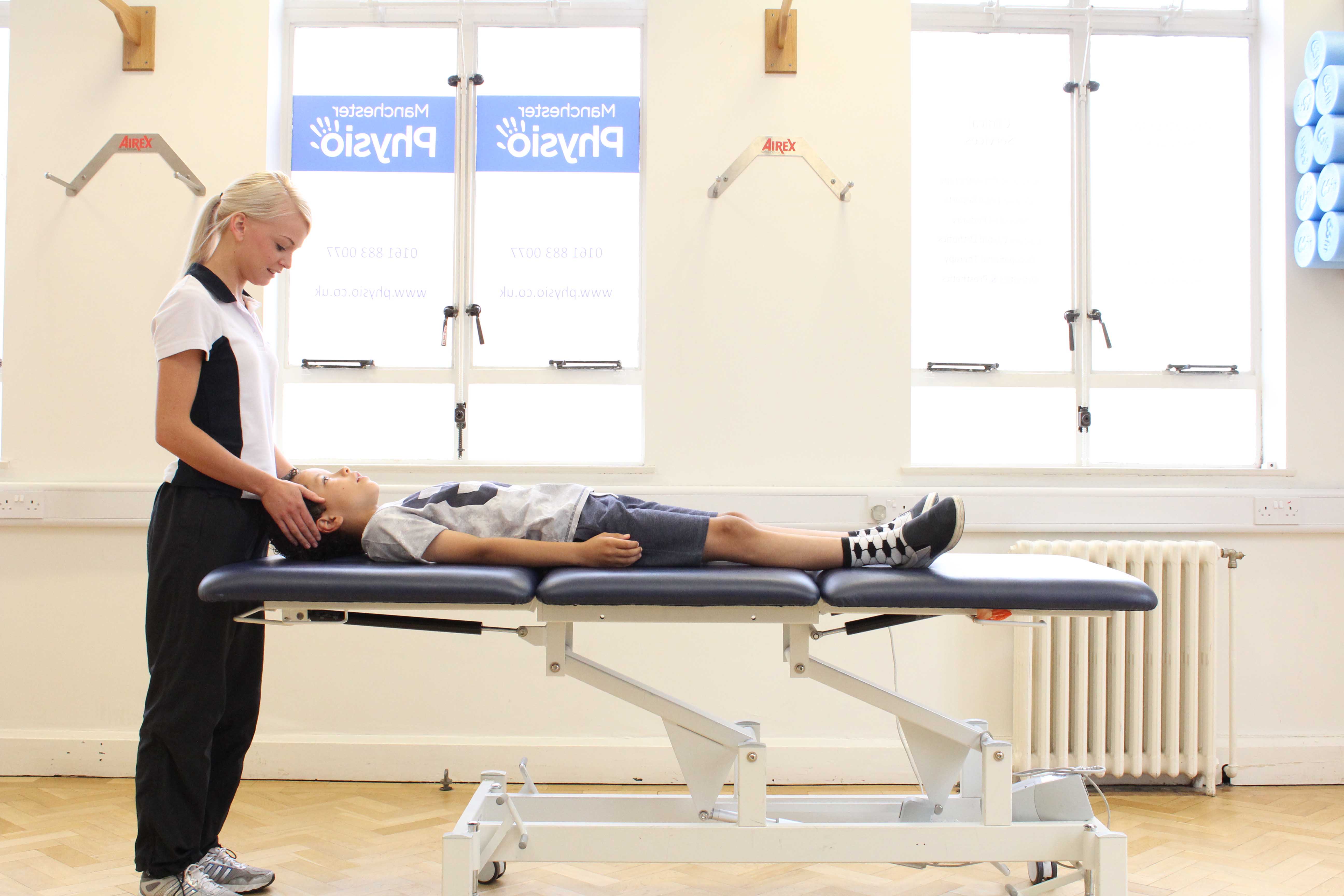What is a head injury?
A head injury or a traumatic brain injury (TBI) occurs when an outside force damages the brain such as a blow to the head which may lead to physical and cognitive impairments.
TBI is commonly referred to as a head injury which involves damages to the brain causing difficulties with communication, cognition and movement such as poor coordination and balance.
A head injury causes damage to the brain by limiting blood flow and the supply of oxygen or by putting pressure on the brain. Both these factors lead to death of brain cells.
Every head injury is different and every person with a head injury will be affected differently. The effects of a head injury will depend upon the severity and the location of the injury in the brain. The long-term effects of a head injury will also depend on the age of the person involved.
Physiotherapy can help people in their physical recovery following a brain injury.
 Above: Physiotherapist facilitating a gripping exercise designed to promote independance
Above: Physiotherapist facilitating a gripping exercise designed to promote independanceDiagnosis of a head injury
Brain imaging such as Computerised Tomography (CT) and Magnetic Resonance Imaging (MRI) are used to assess the extent of damage on the brain following a head injury.
What causes a head injury?
The most common cause of a head injury is road traffic accidents. Other causes of head injuries include sports-related injuries, accidents, falls or assaults at home or in the workplace.
What are the long-term effects of a head injury?
The long-term consequences of a brain injury can affect all aspects of everyday life, including movement, perception, cognition, communication and personality.
Non physical effects include:
- Cognition (thinking, memory, and reasoning)
- Sensory processing (sight, hearing, touch, taste, and smell)
- Communication (expression and understanding)
- Behaviour (depression, anxiety, personality changes, aggression, and social inappropriateness)
- Reduced mobility
- High or low muscle tone
- Abnormal movement patterns
- Reduced muscle strength
- Reduced coordination in the body, arms, and legs
- Loss of balance
Our dedicated neurological physiotherapists at Physio.co.uk, will increase your quality of life by promoting your independence and reducing the impact of these problems on your life.
Physiotherapy following a head injury
At Physio.co.uk we understand that a head injury can cause significant changes in your life. People who have suffered from a head injury will benefit from specialist neurological physiotherapy.
For the best possible recovery, it is important to start physiotherapy as soon as possible as the brain is adaptable and significant improvements can be made. Long-term improvements can also be made over several years and it may take time to reach your potential. Physiotherapy should continue when you have left hospital as Physio.co.uk commonly see individuals that have previously been discharged from NHS physiotherapy go on to make significant improvements. Our physiotherapists will work closely with other NHS physiotherapists that you may already have order to achieve the best possible recovery.
The physiotherapists at Physio.co.uk will advise and support you throughout your treatment and maximise your potential in order that long term improvements can be achieved. Physiotherapy treatment can help:
- Promote normal movement in the arms, legs and trunk
- Increase muscle length and relieve muscle and joint stiffness
- Increase muscle strength
- Increase range of movement
- Improve balance and posture
- Improve functional abilities such as transfers
- Increase ability to roll/move in bed/sit/stand
- Increase exercise tolerance
- Prevent risk of falling
- Advise you on the use of walking aids, splints, supports and home equipment to make your life easier
- Promoting independence, sense of well being and confidence
- Improving quality of life
Manchester Physio are also able to provide manual handling training sessions for carers and families. This training involves educating family, and/or carer son therapeutic handling and positioning techniques that will promote normal movement and postural alignment to those caring for you. The therapeutic use of specific hoists and slings can also be taught. Where required postural, bed, seating and wheelchair assessments can be carried out by our specialist physiotherapists.
Every person and every head injury is unique. Therefore, Physio.co.uk offer many types of physiotherapy treatments for people with head injuries centred on meeting your individual needs. These include: Every person and every head injury is unique. Therefore, Physio.co.uk offer many types of physiotherapy treatments for people with head injuries centred on meeting your individual needs. These include:
- Specific strengthening exercises to increase muscle strength
- Stretching techniques to help lengthen tight muscles reducing stiffness and improving your mobility
- Exercises to build stamina and reduce fatigue
- Teaching new ways of achieving function
- use of non-dominant hand
- use of objects to help with everyday tasks
- breakdown of complex tasks
- Repetitive exercise to recruit muscles and improve function
- Correcting and varying position to improve balance and coordination. Treatment will focus on sitting and standing balance and the way you walk
- Exercises to improve posture and comfort when lying, sitting and standing
- Teaching transfers (getting in and out of a wheelchair, bed, car, shower/bath and onto and off a toilet)
- Hydrotherapy treatment to work on activities that may not be possible on dry land.
During your initial assessment we will discuss your short and long term rehabilitation goals. These goals will then be at the centre of your rehabilitation. To arrange an assessment to get an idea of your rehabilitation potential please call 0330 088 7800, book online or alternatively request a free phone consultation.

 0330 088 7800
0330 088 7800

































